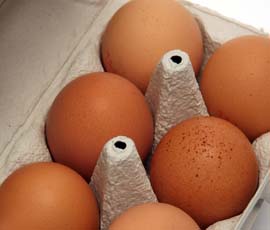Egg washing back in fashion

The much maligned practice of egg washing has been leant credence by a study conducted between EU universities and UK universities, showing responsible use of egg washing improves the safety of eggs.
Egg washing has not been encouraged in the EU because of the requirement for all class A eggs for human consumption to have no damage to the cuticle, microscopic holes on the egg which can allow bacteria inside the egg when damaged.
Washing is believe to be the number one method with which the cuticle receives damage.
The findings are from a study conducted by the Institute for Agricultural and Fisheries Research (ILVO) in Melle, Belgium and the University of Glasgow’s College of Medical, Veterinary and Life Sciences and is published in the October 2011 issue of the Journal of Food Protection.
The research was commissioned by an industry consultancy on behalf of a manufacturer of egg washing equipment.
“Responsible egg washing leaves the eggs’ natural defence system intact and the process’ sanitation effect sharply reduces on-shell bacterial loads and removes dirt from the shell,” said Stijn De Preter, CEO of egg industry consultancy Eggnology.
In the USA the United States Department of Agriculture mandates all eggs are washed, while in Sweden eggs are also washed before human consumption.
The ILVO study washed the eggs with a dye that only attaches to the cuticle while the University of Glasgow study combined visual assessment methods, including scanning electron microscopy and blind evaluation by an eggshell assessor.
Both organisations concluded: “No evidence could be found to suggest that the washing procedure used in this investigation irreversibly changed the quality of the cuticle.”
